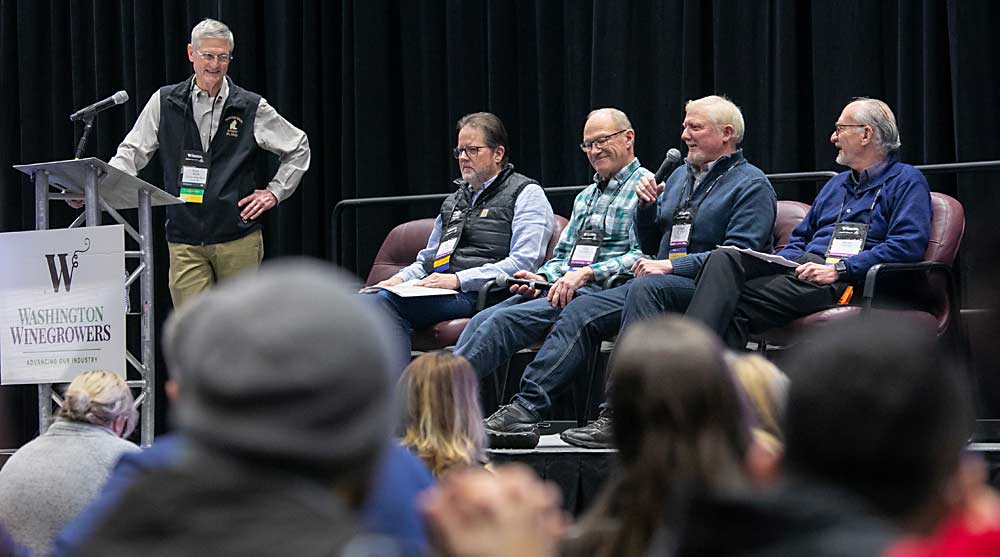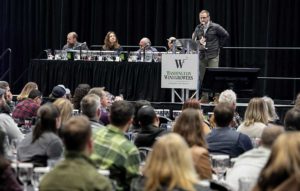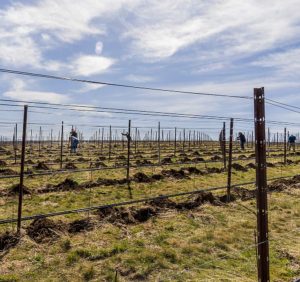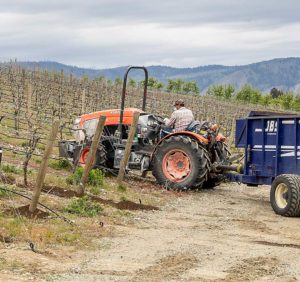
The second day of the Washington wine industry’s annual convention hosted panels of industry leaders talking about the future, from replanting on rootstocks to marketing momentum around sustainability.
On a panel titled “Learning from a look back,” industry leaders with a combined 160 years of experience between them reflected on how the wine industry’s investment in research and education has helped it to grow and be prepared to face the current and coming challenges, including climate change.
“I think we laid a good foundation with research to help us adapt to what Mother Nature is throwing at us,” said grower Dick Boushey of Boushey Vineyards. “I’m not as scared of what is going to happen with climate change, especially with our researchers to help us. …We’re in better shape than we’ve ever been to adapt.”
Brian Carter, owner of Brian Carter Cellars, echoed the value of industry investment in research and education.
“This industry has stepped up to develop a world-class viticulture and enology education,” he said.
That investment, along with support for and participation on the industry’s organizations, remains critical, Carter and Boushey said.
“Every company in our industry needs to invest in R&D. It’s the only way to stay in business,” Boushey said.
Also on the panel, Marty Clubb, owner of L’Ecole No. 41 winery in Walla Walla, spoke about his approach to keep his estate vineyard supplying his winery while he replants onto rootstocks, and Kevin Corliss, vice president of vineyards at Ste. Michelle Wine Estates, talked about the production benefits he’s found replanting onto rootstocks.
A second panel discussion focused on Sustainable WA, the vineyard certification program the wine industry launched last year.
Growers who certified their vineyards last year shared why they wanted to get involved and what the audit experience was like.
While people often associate sustainability with the environmental impact of farming practices such as pest and irrigation management, the program also focuses on having good employment practices and a strong business plan.
“This is the first audit where I felt like all three tiers of sustainability were represented,” said Sadie Drury, general manager of vineyard management company North Slope Management. “It’s taking care of the land, taking care of people and taking care of your business.”
Panelists stressed the importance of preparing for the audit by using the self-assessment tool and organizing documentation for spray records, safety meetings and employee handbooks, to name a few.
The audit process did result in making a few changes, and panelists cited examples such as different ways to document processes or manage records, updating safety equipment and certifications, and producing a Spanish edition of the employee handbook.
Marshall Edwards, vineyard director at Shaw Vineyards, said it was fairly simple to document the farming practices to meet the standards. “Because we are already doing sustainable practices; we are doing everything we can to be profitable and not use chemicals we don’t need,” he said.
Other panelists included Andy Slusarenko of Three Rivers Winery, Shane Collins of Rocky Pond Winery, and Ella Vincent and Patrick Rawn of Two Mountain Winery.
Rawn encouraged others with a passion for the topic to get involved in the governance council and its technical committee, which will administer the program going forward.
“We want it to be built by the industry, for the industry, and operated by the industry in perpetuity,” he said.
—by Kate Prengaman









Here at the Slow Wine Guide USA, our goal is to list more Washington wineries that meet our criteria of no synthetic herbicide use in the vineyard. Wineries don’t have to be certified but transperancy is key. We encourage wineries to reach out to us for a free listing in the 2024 edition. Our 2023 guide, the sixth edition, features 290 wineries from CA, OR, WA and NY states and is available at https://slowfoodusa.org/product/slow-wine-guide-usa-2023/ discount code winemember10. Deborah Parker Wong, National Editor. Find us on social at @Slow_Wine_Usa